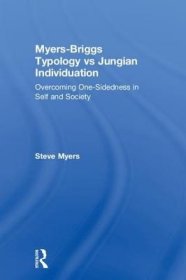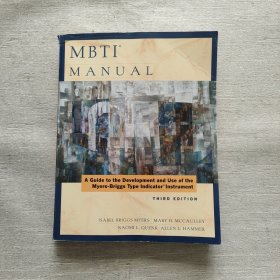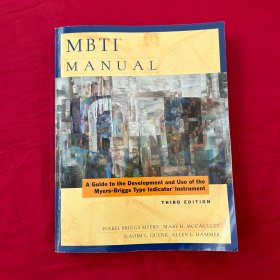
现货Myers-Briggs Typology Vs. Jungian Individuation: Overcoming One-Sidedness In Self And Society[9781138230835]
¥ 1358 九五品
仅1件
作者Myers, Steve
出版社Routledge
ISBN9781138230835
出版时间2018-11
装帧精装
纸张其他
页数252页
正文语种英语
上书时间2024-03-15
- 最新上架
商品详情
- 品相描述:九五品
- 商品描述
- In Myers-Briggs Typology vs Jungian Individuation: Overcoming One-Sidedness in Self and Society, Steve Myers unravels the century-long misinterpretation of Jung's seminal text, Psychological Types, to show how Jung's thinking offers solutions to the conflicts that have torn apart our societies. By challenging the popular interpretation of the Myers-Briggs Type Indicator(R) and similar instruments, Myers argues that we have not only missed Jung's main proposition, but our contemporary interpretation runs counter to it. Myers aims to rediscover the overlooked argument of Jung's Psychological Types and make it of practical relevance to contemporary issues. He intends to refocus rather than discard Myers-Briggs typology, showing that there are further stages of development after becoming a type and that typological principles have a much broader application. Raising queries about the way typology is used in contemporary society, Myers uses literary examples, such as Romeo and Juliet and Carl Spitteler's Prometheus and Epimetheus, to show how one-sidedness leads to conflict and to illustrate Jung's solution to the problem of opposites. He also applies this to real-life political crises by examining the decision-making of key political figures, such as Nelson Mandela, Robert Mugabe, and those involved in Brexit or the Northern Ireland peace process. The latter part of the book relates Jung's process of typological development to his later writings on alchemy, notably the axiom of Maria, to show how they all have a common goal, the transformation of attitude. The book concludes by analysing the implications of the divergence of Myers-Briggs typology and Jungian individuation for the communities who use those ideas. This book puts Jungian individuation back at the forefront of debate and will be essential reading for intermediate and advanced users of Myers-Briggs typology. Due to its political relevance, it will also be of interest to Jungian analysts and their clients, and to academics and students of Jungian and post-Jungian ideas and political science.
相关推荐
-

MYERS-BRIGGS’PERSONLIGHEDSTYPER
八品汕头
¥ 100.00
-

Mbti Manual: A Guide to the Development and Use of the Myers-briggs Type Indicator
八五品北京
¥ 650.00
-

Mbti Manual: A Guide to the Development and Use of the Myers-briggs Type Indicator Instrument
九品北京
¥ 700.00
-

MBTI Manual:A Guide to the Development and Use of the Myers-Briggs Type Indicator, 3rd Edition
八五品北京
¥ 800.00
-

现货 The Brown-Driver-Briggs Hebrew and English Lexicon 希伯来语词典 亚拉姆语版
九品北京
¥ 400.00
-

现货 The Brown-Driver-Briggs Hebrew and English Lexicon 希伯来语词典 亚拉姆语版
九五品北京
¥ 400.00
-
![现货 T5-1 Fr (Iste) [9781848217782]](https://www0.kfzimg.com/sw/kfz-cos/kfzimg/17733071/b07eac013a7d803e_s.jpg)
现货 T5-1 Fr (Iste) [9781848217782]
九五品上海
¥ 1624.00
-

现货Ripped: T-Shirts from the Underground
九品北京
¥ 156.00
-

《星际迷航-红衫》正版 现货 T架
九品广州
¥ 138.00
-

North American T-6 Texan原版现货
九五品衡水
¥ 88.00
— 没有更多了 —
![现货Myers-Briggs Typology Vs. Jungian Individuation: Overcoming One-Sidedness In Self And Society[9781138230835]](https://www0.kfzimg.com/sw/kfz-cos/kfzimg/17733071/cb163fe6efa1d888_b.jpg)

![Petrucci's General Chemistry: Principles and Modern Applications [9781292726137]](https://www0.kfzimg.com/sw/kfz-cos/kfzimg/17733071/f3b0e1ed1b0ac6e4_s.jpg)
![现货Materials and Technologies of Modern Production[9783036401683]](https://www0.kfzimg.com/sw/kfz-cos/kfzimg/17733071/5fd2824531e165d7_s.jpg)
![现货Introduction to Container Ship Operations and Onboard Safety[9781032155425]](https://www0.kfzimg.com/sw/kfz-cos/kfzimg/17733071/58b7ff43ef7909ee_s.jpg)
![现货Electrophosphorescent Materials and Devices[9789814877343]](https://www0.kfzimg.com/sw/kfz-cos/kfzimg/17733071/18cc1d77bcb7b488_s.jpg)
![现货Organic Semiconductors for Optoelectronics[9781119146100]](https://www0.kfzimg.com/sw/kfz-cos/kfzimg/17733071/24c85a750c708964_s.jpg)
![现货Advances in Food Rheology and Its Applications[9780081004319]](https://www0.kfzimg.com/sw/kfz-cos/kfzimg/17733071/e0c11603c9119d4d_s.jpg)
![现货Advanced Materials and Sustainable Technologies[9783035727562]](https://www0.kfzimg.com/sw/kfz-cos/kfzimg/17733071/dced675333874c48_s.jpg)
![现货Advanced Materials and Manufacturing Engineering II[9783035712681]](https://www0.kfzimg.com/sw/kfz-cos/kfzimg/17733071/660ccfae75fa8d3e_s.jpg)
![现货Materials in Machinery and Construction[9783035718119]](https://www0.kfzimg.com/sw/kfz-cos/kfzimg/17733071/6f402060775e9daa_s.jpg)
![现货Myers-Briggs Typology Vs. Jungian Individuation: Overcoming One-Sidedness In Self And Society[9781138230835]](/dist/img/error.jpg)


以下为对购买帮助不大的评价